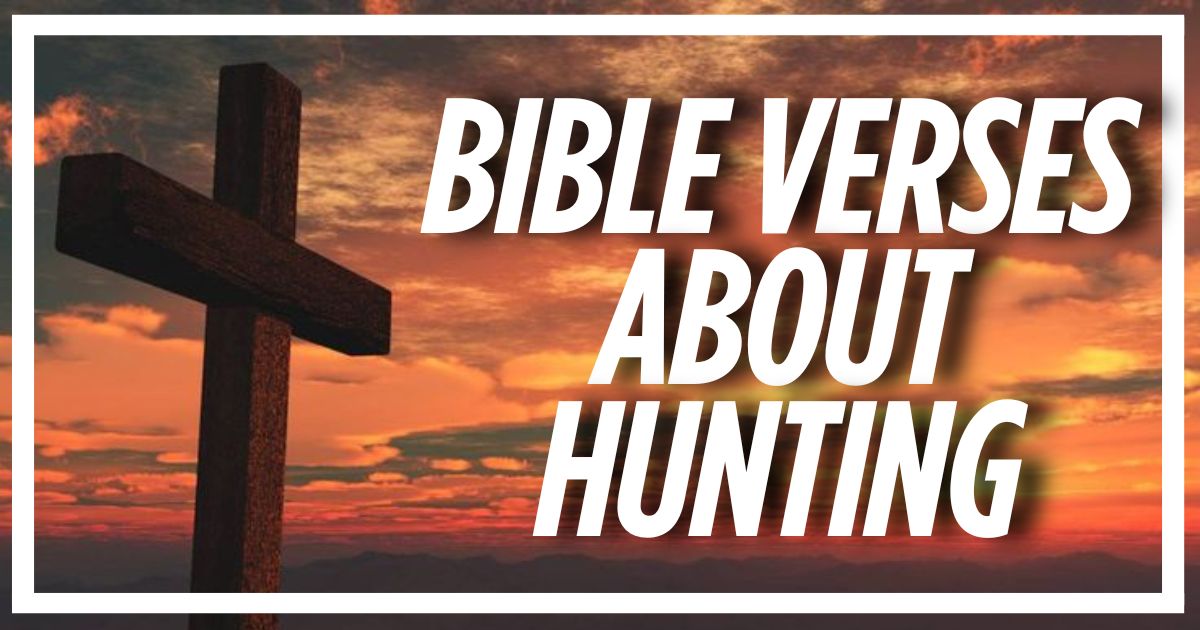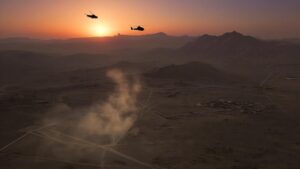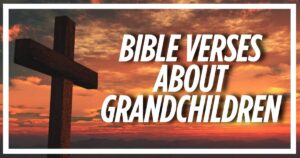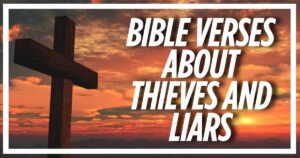Bible Verses About Hunting offer wisdom and guidance for those who enjoy the outdoors. In the Bible verses about hunting, we see how hunting was a part of life in ancient times. Whether it’s a hunting Bible verse or a passage about wild game, these verses provide insights into God’s creation. For example, in the Bible verses about hunting, the skill of hunters like Nimrod is praised.
Many outdoorsman Bible verses show the importance of diligence and skill when hunting. The Bible verse about hunting can teach lessons about patience and respect for nature. From hunting in the Bible to understanding the sanctity of life, these scriptures connect hunting with moral lessons and God’s plan. These verses remind us of our connection to nature and the wisdom of the Bible.
Top Bible Verses About Hunting
Top Bible Verses About Hunting reflect the importance of animals, nature, and the skills needed for survival. From David’s protection of his flock against lions and bears in 1 Samuel 17:34 to God’s permission for hunting in Genesis 9:3, these verses highlight the relationship between humanity and wildlife. Hunting in the Bible often symbolizes strength, courage, and resourcefulness, serving as a metaphor for spiritual battles and God’s provision. Whether it’s the wisdom of Proverbs or the symbolic peace in Isaiah, these Bible Verses About Hunting show how hunting relates to both practical and spiritual life.
Genesis 27:3
“Now then, get your weapons, your quiver and bow, and go out to the open country to hunt some wild game for me.”
This verse shows Isaac instructing his son to go hunting for food. It emphasizes the practical nature of hunting and its importance for survival in biblical times.
Genesis 10:9
“He was a mighty hunter before the Lord; therefore it is said, ‘Like Nimrod, a mighty hunter before the Lord.'”
This verse highlights Nimrod as a skillful hunter, recognized for his strength and abilities. It associates hunting with power and respect in the Bible.
Proverbs 12:27
“Lazy people don’t even cook the game they catch, but the diligent make use of everything they find.”
This verse contrasts the diligent and the lazy, using hunting as an example. It emphasizes the virtue of hard work and the practical benefits of resourcefulness, encouraging the full utilization of one’s efforts.
Psalm 42:1
“As the deer pants for streams of water, so my soul pants for you, my God.”
This verse uses the image of a deer hunting for water to symbolize a deep spiritual longing for God. It reflects the connection between nature and spiritual thirst.
Jeremiah 16:16
“But now I will send for many fishermen, declares the Lord, and they will catch them. After that I will send for many hunters, and they will hunt them.”
This verse speaks of a time of judgment, where hunters will be sent by God. It uses hunting as a metaphor for God’s plans of gathering and judgment.
Job 38:39
“Do you hunt the prey for the lioness and satisfy the hunger of the lions?”
God challenges Job, asking if he controls the hunting instincts of animals. It emphasizes God’s sovereignty over creation and His care for all creatures, even in their hunting needs.
Leviticus 17:13
“Any Israelite or any foreigner residing among them who hunts an animal or bird that may be eaten must drain out the blood and cover it with earth.”
This verse gives instructions about the proper way to handle animals after hunting, emphasizing the importance of respecting life and following God’s commands in the process of hunting.
Proverbs 6:5
“Free yourself, like a gazelle from the hand of the hunter, like a bird from the snare of the fowler.”
This verse uses the imagery of a hunted animal to symbolize escaping from harmful situations. It encourages wisdom and quick action to avoid traps, both physical and metaphorical.
Genesis 21:20
“God was with the boy as he grew up. He lived in the desert and became an archer.”
This verse speaks of Ishmael, who grew up in the wilderness and became a skilled archer, reflecting the importance of hunting skills in the survival of God’s people.
Proverbs 12:10
“The righteous care for the needs of their animals, but the kindest acts of the wicked are cruel.”
This verse highlights the relationship between humans and animals, urging care and kindness toward animals, including those that may be hunted for food.
Exodus 23:11
“But during the seventh year, let the land lie fallow and lie unplowed. Then the poor among your people may get food from it, and the wild animals may eat what they leave.”
This verse talks about the importance of leaving the land to rest. It ensures that wild animals have enough food, showing God’s care for animals and nature, even in the context of hunting.
Deuteronomy 12:15
“Nevertheless, you may slaughter and eat meat within any of your gates, whatever your heart desires, according to the blessing of the Lord your God which He has given you.”
This verse permits the Israelites to hunt and consume meat as they desire, providing guidelines for meat consumption within their community.
1 Samuel 17:34
“But David said to Saul, ‘Your servant has been keeping his father’s sheep. When a lion or a bear came and carried off a sheep from the flock, I went after it, struck it and rescued the sheep from its mouth.'”
This verse describes David’s bravery and skill in defending his flock from predators. It highlights the importance of courage and hunting ability in biblical times.
Amos 3:5
“Does a bird fall into a trap on the ground when no snare has been set for it? Does a trap spring up from the ground if it has not caught anything?”
This verse uses hunting imagery to explain how traps are set. It draws a parallel to how events unfold, emphasizing God’s control over circumstances.
Isaiah 11:6
“The wolf will live with the lamb, the leopard will lie down with the goat, the calf and the lion and the yearling together; and a little child will lead them.”
This verse speaks of a peaceful future, where predators and prey live in harmony. It offers a hopeful vision of God’s creation restored, where hunting and violence are no longer needed.
Deuteronomy 14:5
“The deer, the gazelle, the roe deer, the wild goat, the ibex, the antelope and the mountain sheep.”
This bible verse lists clean animals that can be hunted and eaten, showing God’s instructions for which animals are allowed for consumption, part of maintaining purity and holiness.
Genesis 9:3
“Everything that lives and moves about will be food for you. Just as I gave you the green plants, I now give you everything.”
This verse from God’s covenant with Noah permits humans to eat all living creatures, including those hunted, signifying a new relationship between humanity and animals post-flood.
Isaiah 7:24
“In that day, people will come to a great place, with bows and arrows, for all the land will be briers and thorns.”
This verse refers to a time when hunting and warfare will be needed due to the state of the land, symbolizing judgment and hardship in the future.
1 Samuel 26:20
“Now do not let my blood fall to the ground far from the presence of the Lord. The king of Israel has come out to look for a flea—like one who hunts a partridge in the mountains.”
David speaks of being hunted like a small, insignificant creature, highlighting his vulnerability and comparing his situation to hunting a partridge, a small and elusive bird.
Psalm 124:7
“We have escaped like a bird from the fowler’s snare; the snare has been broken, and we have escaped.”
This verse uses the image of a bird escaping a trap to symbolize God’s deliverance from danger. It emphasizes the idea of being freed from harmful traps and snares.
Ezekiel 13:18
“Thus says the Lord God: Woe to the women who sew magic bands upon all wrists and make veils for the heads of people of every stature to hunt down souls!”
This verse speaks of false practices and deception used to “hunt down” souls, warning against spiritual traps and deceitful actions that harm others.
1 Kings 18:27
“At noon Elijah began to taunt them. ‘Shout louder!’ he said. ‘Surely he is a god. Perhaps he is deep in thought, or busy, or traveling. Maybe he is sleeping and must be awakened.'”
Elijah mocks the false prophets, using a metaphorical “hunting” of their god’s power. The imagery conveys Elijah’s challenge to the prophets to prove their god’s presence.
Proverbs 1:17
“How useless to spread a net in full view of all the birds!”
This proverb uses the imagery of a net set in plain sight to show that the wicked cannot hide their intentions. It serves as a metaphor for traps set for people, warning against deceitful actions.
Isaiah 51:20
“Your sons have fainted; they lie at the head of every street, like an antelope in a net. They are filled with the wrath of the Lord, with the rebuke of your God.”
This verse depicts people in danger, trapped like animals in a net, symbolizing the judgment and consequences they face. It emphasizes the feeling of being hunted or caught in sin.
Genesis 25:27
“The boys grew up, and Esau became a skillful hunter, a man of the open country, while Jacob was content to stay at home among the tents.”
This verse contrasts Esau’s hunting skills with Jacob’s preference for staying home. It highlights the different lifestyles of the two brothers, with hunting as an essential part of Esau’s identity.
Psalm 140:5
“The proud have hidden a snare for me; they have spread out the cords of a net and have set traps for me along my path.”
This verse uses the imagery of traps and snares to express the psalmist’s feelings of being hunted by enemies. It emphasizes the danger of being ensnared by wickedness.
Ecclesiastes 9:12
“Moreover, no one knows when their hour will come: As fish are caught in a cruel net, or birds are taken in a snare, so people are trapped by evil times that fall unexpectedly upon them.”
This verse compares people to fish caught in a net, symbolizing how unpredictable and sudden troubles can be, leading to being trapped unexpectedly by life’s challenges.
Isaiah 33:20
“Look upon Zion, the city of our festivals; your eyes will see Jerusalem, a peaceful abode, a tent that will not be moved; its stakes will never be pulled up, nor will any of its ropes be broken.”
This verse contrasts the peace of Jerusalem with the imagery of being “hunted” by enemies. It promises stability and peace, symbolizing safety from external threats.
Micah 7:2
“The faithful have been swept from the land; not one upright person remains. Everyone lies in wait to shed blood; they hunt each other with nets.”
This verse speaks of moral decay, where people are hunting each other for their own benefit. It highlights the societal breakdown and the dangerous environment of betrayal and deceit.
Proverbs 23:27
“For a prostitute is a deep pit, and a promiscuous woman is a narrow well.”
This proverb warns against the dangerous allure of immorality, likening it to being trapped or hunted by temptation. It uses vivid imagery to caution against falling into harmful situations.
Psalm 91:3
“Surely he will save you from the fowler’s snare and from the deadly pestilence.”
This verse speaks of God’s protection, promising deliverance from traps and snares. It reassures that God will rescue from the dangers that hunt or threaten to ensnare.
Habakkuk 1:15
“The wicked foe pulls all of them up with hooks, he catches them in his net, he gathers them up in his dragnet, and so he rejoices and is glad.”
This verse describes the wicked as hunters who use nets and hooks to catch their prey. It highlights the injustice of those who trap and exploit others.
Job 18:8
“For he is cast into a net by his own feet and walks into a snare.”
This verse uses the image of a man walking into a snare to illustrate how the wicked trap themselves. It serves as a warning about the consequences of sinful actions.
Psalm 91:13
“You will tread on the lion and the cobra; you will trample the great lion and the serpent.”
This verse promises protection from dangerous creatures, symbolizing God’s power over all that threatens us. It uses hunting imagery to depict victory over powerful enemies.
Psalm 124:7
“We have escaped like a bird from the fowler’s snare; the snare has been broken, and we have escaped.”
This verse repeats the imagery of a bird escaping from a trap, celebrating God’s deliverance from danger. It emphasizes freedom and protection from harm.
1 Samuel 17:34
“But David said to Saul, ‘Your servant has been keeping his father’s sheep. When a lion or a bear came and carried off a sheep from the flock, I went after it, struck it and rescued the sheep from its mouth.'”
David recounts his experience defending his flock from predators like lions and bears. His skill as a shepherd and hunter is a metaphor for bravery and protection.
Amos 3:5
“Do two walk together unless they have agreed to do so? Does a lion roar in the thicket when it has no prey? Does it growl in its den when it has caught nothing?”
Amos uses the imagery of a lion hunting its prey to emphasize that actions, like walking together or roaring, happen only when there is purpose, pointing to inevitable consequences.
Isaiah 11:6
“The wolf will live with the lamb, the leopard will lie down with the goat, the calf and the lion and the yearling together; and a little child will lead them.”
This verse envisions a peaceful future, where once-predatory animals, such as the wolf and the lion, live harmoniously with their prey. It symbolizes peace and harmony in God’s kingdom.
Deuteronomy 14:5
“The goat, the antelope, the gazelle, the mountain sheep, and the ibex are among the animals you may eat.”
This verse lists clean animals that the Israelites are permitted to eat, illustrating the importance of the dietary laws concerning meat consumption and hunting in the Bible.
Genesis 9:3
“Everything that lives and moves will be food for you. Just as I gave you the green plants, I now give you everything.”
After the flood, God grants Noah and his sons the right to hunt and eat animals. This verse emphasizes the divine permission for hunting and meat consumption.
Isaiah 7:24
“In that day, people will come to a great place, with bows and arrows, for all the land will be briers and thorns.”
This prophecy envisions a future where people, needing to hunt and gather, will use bows and arrows in a land full of hardship, symbolizing tough times ahead.
1 Samuel 26:20
“Now do not let my blood fall to the ground far from the presence of the Lord. The king of Israel has come out to look for a flea—like one who hunts a partridge in the mountains.”
David compares his pursuit by King Saul to hunting a partridge, a small and elusive bird, highlighting his vulnerability and Saul’s relentless pursuit of him.
Psalm 124:7
“We have escaped like a bird from the fowler’s snare; the snare has been broken, and we have escaped.”
This verse likens the people’s escape from danger to a bird fleeing from a trap. It celebrates deliverance from harm, symbolizing God’s protection over His people.
Ezekiel 13:18
“Thus says the Lord God: Woe to the women who sew magic bands upon all wrists and make veils for the heads of people of every stature to hunt down souls!”
In this warning, Ezekiel condemns deceitful practices that entrap souls, likening them to hunting methods. It emphasizes the need for spiritual caution and awareness.
1 Kings 18:27
“At noon Elijah began to taunt them. ‘Shout louder!’ he said. ‘Surely he is a god. Perhaps he is deep in thought, or busy, or traveling. Maybe he is sleeping and must be awakened.'”
Elijah mocks the false prophets with hunting-style taunts, emphasizing the futility of their worship and urging them to prove their god’s existence, much like a hunter would taunt his prey.
FAQ’s
What are some Bible verses about hunting?
Bible verses about hunting highlight the skill and respect needed for hunting. They teach moral lessons about patience and God’s creation in nature.
Is there a hunting Bible verse that mentions animals?
Yes, several Bible Verses About Hunting mention animals like wild game and deer. They connect hunting to God’s purpose and respect for life.
Where can I find Bible verses about hunting in the Bible?
Bible verses about hunting can be found in books like Genesis, Leviticus, and Proverbs. They often mention hunters like Nimrod and the importance of diligence.
What does the Bible verse about hunting teach us?
The Bible Verses About Hunting teaches respect for God’s creation, patience, and the balance between nature and the importance of skillful hunting.
How does hunting in the Bible reflect moral values?
Bible Verses About Hunting reflects moral values like diligence, respect for animals, and understanding the sanctity of life. It emphasizes skill and responsibility in hunting.
Conclusion
Bible verses about hunting offer valuable lessons for hunters and outdoorsmen. These verses teach respect for animals and nature, as well as the importance of skill and patience. Bible verses about hunting are not just about hunting for food, but also about understanding God’s creation and the sanctity of life. They encourage us to be diligent and responsible.
The hunting Bible verse reminds us that hunting is part of God’s plan. Whether you’re reading about hunting in the Bible or reflecting on outdoorsman Bible verses, these passages offer wisdom. They remind us of the balance between nature and the need for stewardship. Bible verses about hunting show how hunting connects us to the natural world, teaching valuable lessons about life and faith. Let these teachings guide your approach to hunting and life.

Tobi Ayo is an experienced admin at KJV Study Bible, a blogging site dedicated to in-depth Bible study and Christian resources. With over 5 years of expertise in managing content, optimizing user experience, and ensuring smooth site operations, Tobi has been instrumental in building a reliable platform for Bible enthusiasts across Nigeria.




